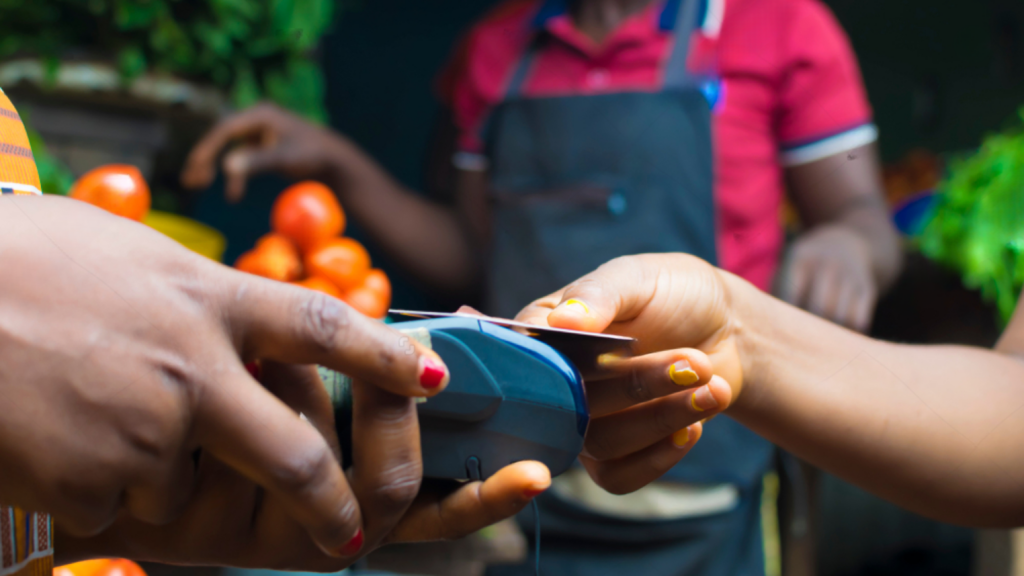Like a penis on a cold harmattan morning, the Nigerian middle class is shrinking fast. People who used to flaunt their big Spar and ShopRite shopping bags now clutch their purses tighter than a Danfo conductor holding change. Everyone’s looking for where to save ₦50. Those online shopping budgets have relocated to Obalende market and Onitsha main markets.
For years, I’ve been saying it: there’s no real middle class in Nigeria — just vibes and packaging. And with how things are going, it feels like a confirmation email from life itself. But you know what? It only strengthens my conviction to bet on the informal market helping Mama Chukwudi collect ₦300 digitally so you can pay her like you used to in your Spar shopping spree.
Let me just say this: Moniepoint, una do well. In just 24–36 months (from when I started counting), they’ve shown us how untapped the informal sector truly is. They’ve practically defined agency banking, extending easy access to cash and freeing the banking halls, and it’s worth clapping for, but thats just the tip of the iceberg, as Tosin Eniolorunda, the CEO of Moniepoint rightly said.
Now, think about this: If you can’t find a job, the next option will be to set up a small nail-fixing booth in Ajah market. Or, if school didn’t happen for you, you’d probably already have hustled through several markets selling everything from chin-chin to crayfish. That’s the kind of resilience that birthed this massive but overlooked informal market.
Despite all this activity, commercial banks don’t seem to rate the market. Ten years ago, they ignored it. Today, even with fintech companies making waves, they’re still not interested. Why? Truth be told, the informal market is hard to crack. It’s nothing like what they’ve been doing for decades — suits, ties, and signatures. No way to fit the informal market’s hustle into its structured systems.
And honestly? They don’t have to. With the big corporate accounts and massive profits they’ve been raking in recently, these banks have more than enough meat to chew. Kudos to them for not being greedy — or, should I say, innovative? (Abeg oo.)
But Is There Really Money Here?
The short answer: Absolutely. The informal sector isn’t just surviving; it’s thriving. Data from NIBSS shows that cashless transactions rose by over 42% in 2022, hitting ₦395.47 trillion. That’s trillion with a T. Yes, people are moving money around — even if it’s in small, manageable amounts, money just flows there. And it makes sense because we’re all connected to the market and as the middle class disappears, more money for basic needs is spent in the informal markets.
Even the fintechs trying to break through face major challenges. Low and non-literacy levels are massive barriers. I mean, If school didn’t happen for you — which means you can’t read or write — your options narrow to the informal market and most can’t use the so-called banking apps even though they want to.
It’s why, as educated folks, we can read this blog and laugh. But step into Ajah market to buy tomatoes, and you’ll find yourself looking to buy cash from a Moniepoint POS agent. Why? You can’t tell a digital payment story to the Hausa man selling tomatoes or Oga Joe constantly checking his cash drawer in his shoe store.
As the middle class keeps disappearing, the informal market keeps growing. More people are participating, and more money is flowing in. This market is the backbone of our economy. Okay, let’s look at the receipts.
Let’s Crunch Some Numbers
- PoS Transactions: In the first seven months of 2024 alone, PoS transactions hit ₦6.23 trillion. That’s people collecting cash and paying small businesses every day, mainly for food and transportation.
- Cashless Growth: According to NIBSS, Cashless transactions rose by 42.05% in 2022, hitting ₦395.47 trillion. The informal market might look chaotic, but it’s where the action is, and it’s already embracing digital payments at an unprecedented pace.
This tells us one thing: The informal market is where the action is. And the path to truly growing our economy lies in empowering these market players with tools that make their lives and ours easier. That’s where Ant comes in.
The Untapped Treasure
The informal market is like the Jollof rice pot everyone wants a taste of but no one wants to admit has been cooking the economy for decades. Fintechs have figured this out, creating tools that work for market women, roadside barbers, and vulcanizers. Ant made it easier for people like Mama Basirat to accept tap-to-pay card payments with her phone, separate her COGS (cost of goods sold) from profit to know what to spend and what not to touch, and even access small loans.
If we’re serious about tackling poverty and driving economic growth, we need to get the informal market into the digital economy. It’s not just about financial inclusion — it’s about convenience and participation.
Picture this: A buyer walks into Mama Basirat’s shop to buy live chickens. She pops her phone and goes, “Collect ₦12,000 for one chicken” in Hausa language. The buyer taps their card on her phone and boom — payment is complete. No stress. No stories. Just seamless business.
This is the future Ant is building. A system where even the Igbo woman selling vegetables and fish can collect her ₦400 with peace of mind. It’s not just about reducing cash dependency — it’s about freedom.
But it doesn’t stop there. Financial education has a role to play. I wrote a piece about financial literacy here. Not the whiteboard kind that has failed us for years. I’m talking about real, hands-on, “learning-on-the-job” financial literacy powered by artificial intelligence. Cool, right? This is made possible by AI agents that serve as a trusted companion to advise you about your spending habits right inside your banking app, savings potential, and practical ways to improve your finances
The Ant Revolution
The so-called middle class may be melting away, but the informal sector is holding it down for the economy. With the right tools, it can grow even bigger and better with farmers participating. The future of Nigeria isn’t in air-conditioned offices; it’s in the hands of hustlers in Ajah, Balogun, and Onitsha markets. And trust me, if we get it right, even Mama Basirat will be out there collecting her ₦300 digitally like a boss.
So, the next time you’re at the market, buying tomatoes or negotiating for Ankara on a cool Sunday morning, just remember: this is where the magic happens, and you can help bring her to the digital economy by Taping-to-pay her N700.
At Ant, we’re on a mission to make every small trader, roadside vendor, and market woman part of the digital economy. With simple, seamless payment solutions, we’re helping people collect their money without hassle, no matter the size of the transaction, even if they cannot read and write.
Let’s empower the informal market and make financial inclusion more than just a buzzword. If you need help doing that, you know how to find me, and I’ll be happy to share what I know.


